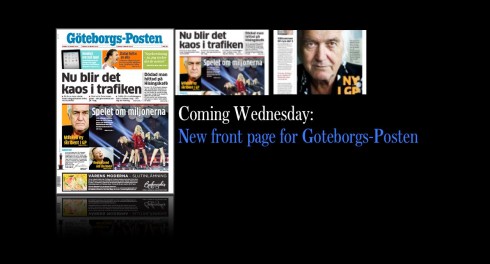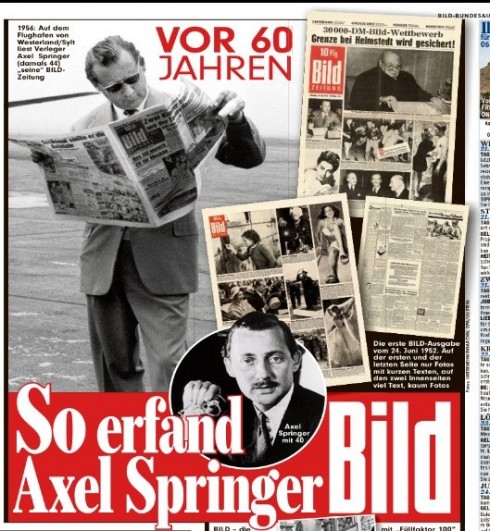TAKEAWAY: We’ve said it before, and we repeat it today (with some positive and strong backing): print affords us to disconnect, and it is not likely to disappear anytime soon. AND: Bild of Germany turns 60 today

Print is eternal
It happened again today here in Charlotte, as we conducted a kickoff workshop for our project with American City Business Journals, publishers of 40 weekly financial newspapers nationwide.
As usually happens sometime before 11 a.m., the question was asked: do you see a future for print?
As I usually answer before 11:10 a.m. each day, my answer was an emphatic YES.
But, and this is a big BUT, print will have to adapt, to mold itself to the new media landscape, to realize that it has lost the time advantage in terms of breaking news, and play the new role of a more analytical, behind-the-news type of publication.
While at it, the printed newspaper’s marketing department should promote the advantage of ink on paper, most important of which is that it allows for disconnectedness. When you sit by the fireplace or under the beach umbrella with your printed newspaper, there are not likely to be any beeps or alerts to lure you away from your story, nor will you be tempted to swipe your screen toward Facebook or Twitter, or check your email.
However, here is one piece in The New York Times, in which two phrases caught my attention:
A reference to 21st Century cacophony—”noises” that surround us and distract us. Indeed, the distractions around us keep us from fully engaging in a traditional solitary activity. According to the piece, some of the millions of consumers who have bought tablets and sampled e-books on apps from Amazon, Apple and Barnes & Noble have come away with a conclusion: It’s harder then ever to sit down and focus on reading.
A reference to the tablet as a “temptress” that is constantly saying, ‘You could be on YouTube now.’ Or sending alerts that pop up, saying you just got an e-mail.
So, we conclude that print offers us disconnect, tempts us only with the enjoyment of reading, and allows us for total concentration.
Eternal values that fuel survival, I would add.
How about survival of the book?
An interesting story about survival of the book appeared in Spain’s El Pais of February 26. The essay, by Juan Cruz, starts with a provocative headline: The book that never ends.
Cruz proceeds to remind us that “they have been trying to kill the book basically since it was born.”
His essay proceeds to question not the survival of the book as a printed medium, but the survival of the book form as we know it, period.
Cruz writes that the reason the book is in danger, more than because of advances in digital technology, is because of the “almost disappearance” of the book editor as we knew it. “We are beginning to see the disfiguration of the personality of the editor. The editor watches over the texts, works in depth with the contents given to him, and, often does so much with the material that when the book is finally printed, the author feels the pride of publishing the book, but also gratitude (probably) for the editor who helped him get it done…..”
But, adds Cruz with a bit of a lament, “the book is no loger what it used to be, it is already becoming something else, whether those who love books and continue to apply that romantic notion that paper and digital will coexist, see it or not. In interviews I have conducted recently with authors and publishers, I emerge with the impression that the editor will continue to be possible and will coexist with the editor (or edition) of the future.”
Cruz ends with a positive statement: “They have tried to kill the book for so long, and it has survived. There is nothing like a book, and it will continue to be so, whether in the hands of Gutenberg or the hands of Steve Jobs.”
This essay appeared in Spanish and the translations of Cruz’ words are my own. Read the essay here: http://elcomentario.tv/reggio/el-libro-de-nunca-acabar-de-juan-cruz-en-el-pais/29/02/2012/
Also about the survival of other things we love
Survival is also probably guaranteed for other items which have served us well through generations, that we are fond of, but that are threatened, by the new technologies, to disappear.
Appropriate to today’s discussion, and very timely, a

Speaking of celebrations of print, today Bild, that most colorful and irreverent of German dailies (or dailies anywhere, for that matter) turns 60 years, and it is a big birthday celebrated through the pages of today’s editions. Frank Deville, our Europe correspondent, sends us this image from today’s Bild
At 60, Bild is still a youthful, energetic newspaper, with a vibrant tablet edition that is unequaled in the number of pop ups it offers and the creativity of them.
Happy birthday, Bild Zeitung!
Alles Gute zum Geburtstag .